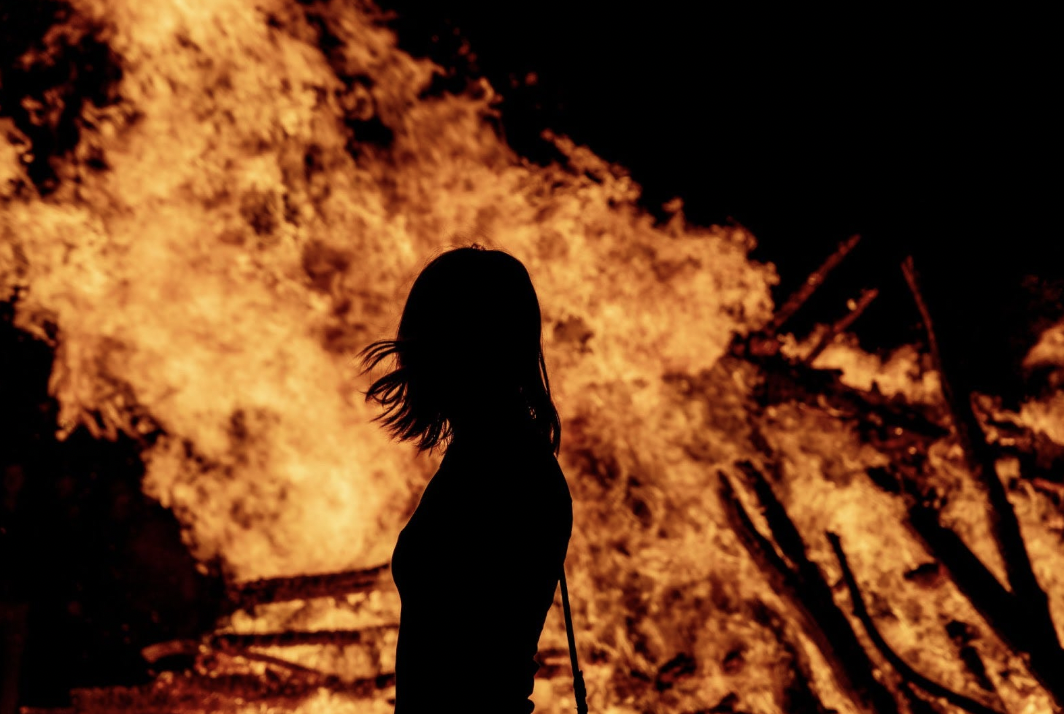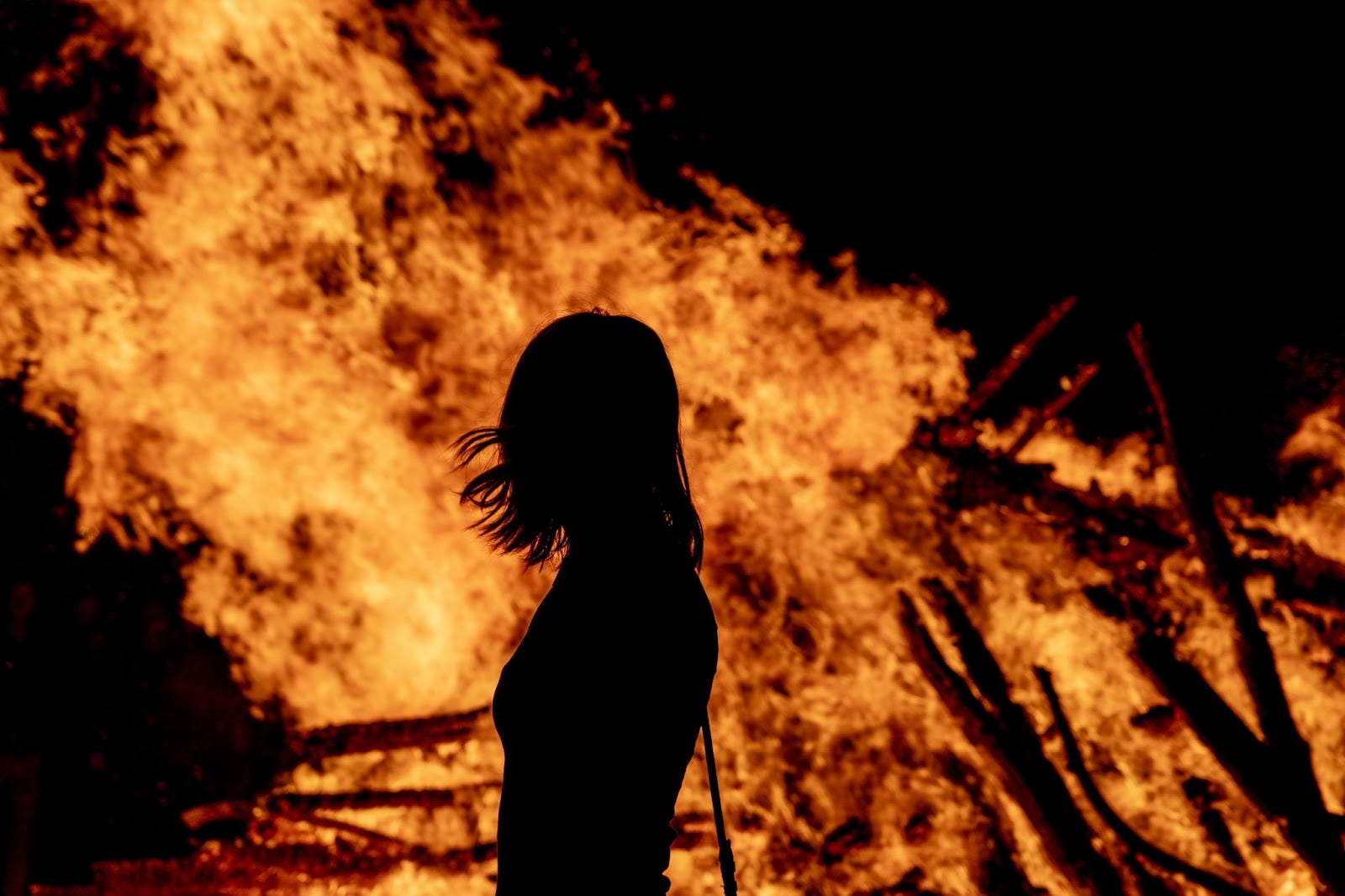On the sin of Sodom
Hint: It's not sodomy

This is Life as a Sacred Text, an expansive, loving, everybody-celebrating, nobody-diminished, justice-centered voyage into one of the world’s most ancient and holy books. We’re generally working our way through Genesis these days. More about the project here, and to subscribe, go here.🌱
A few chapters into Abraham’s story, God decides to share something that’s been on God’s (metaphorical, non-anthropomorphic) mind. That is, the people of the city of Sodom have been, it seems, not behaving optimally, and God is considering deleting the whole city.
The actual text of Genesis 18 and 19 doesn't give us a lot of information about why that city (along with Gomorrah) is so terrible that God ultimately decides to destroy it by raining down sulfurous fire. God describes their sin as great and exceedingly serious. Indeed, the story includes a vignette in which the residents of the town demand that Lot hand over his male guests to the residents "so that they might know them," presumably in a sexual way. (This, of course, is the origin of the term "sodomy.") But there’s a parallel scene in Judges 19--one with language and narrative cues that are so parallel to the Sodom narrative that clearly one of these stories intentionally echoes the other. There, too, there are strangers who arrive in the evening, who go to the city square, there are locals who ignore basic tenets of hospitality, a mob of men demanding the male guest, so that they may have sex with him, and the offering up of women instead.
In the Sodom story, there is a miracle that saves Lot and his family, and the people of Sodom are condemned to death; in Judges, a woman is handed over, raped and murdered—and the perpetrators condemned, with God sanctioning the waging of war against them as vengeance. The people who raped this woman were horrific violators, same as the people of Sodom attempted to be, and God is not on their side. Whatever is going on here, the problem isn't loving, consensual sex between men.
Interestingly, the Jewish tradition--including Biblical sources—doesn’t believe that the sin of Sodom is homosexuality, sexual assault, or even poor hospitality. Rather, as the prophet Ezekiel says,
"This was the guilt of your sister Sodom: arrogance! She and her daughters had plenty of bread and untroubled tranquility, yet she did not support the poor and needy.” (Ezekiel 16:49-50)
The crime so heinous that whole the city had to go up in flames was that of hoarding resources and leaving the economically vulnerable to suffer without assistance.
Gosh, good thing these Biblical stories are really just old tales that don’t have any resonance with our world today, huh?

The Talmud paints Sodom in even starker terms, suggesting that their selfishness and greed caused them to impose, well, immigration and travel bans. In one place, the Talmud (Sanhedrin 109a) conjectures that the people of Sodom said to themselves,
"Why should we suffer wayfarers, who come to us only to deplete our wealth? Come, let us abolish the practice of traveling in our land...."
On that same folio, (109b) the Talmud posits that the Sodomites developed an elaborate ruse to exploit the poor under false pretenses.
"If a poor person happened to come there, every resident gave them a denar [coin], upon which they wrote their name, but no bread was given [that is, the store owners recognized such coins, and refused to accept them]. When they died, each came and took back their (denar)."
A system designed to enable the wealthy to get rich off the suffering and exploitation of the poor? Gosh, sounds a lot like how health care functions in the United States today. And for-profit prisons. And any number of other institutions.
The sources in the Talmud keep going. Sanhedrin 109a asserts,
"The people of Sodom set their sights on property owners. They would take one and place him alongside an inclined, flimsy wall that was about to fall, and push it upon him to kill him, and then they would come and take his property."
Not that we know anything about an eviction crisis here.
And
"There were four judges in Sodom and they were named for their actions: Shakrai, meaning liar, and Shakrurai, habitual liar, Zayfai, forger, and Matzlei Dina, perverter of justice." (Sanhedrin 109b)
Perverter of justice? Forger? Liar? Habitual liar? In our criminal justice system?
When God tells Abraham that God is planning to investigate the citizens of Sodom and, if their deeds are found wanting, to destroy the town, Abraham challenges God—and not once or twice, but six times. He pushes God to consider the possibility that lovingkindness needs to be brought into strict justice. (And yes, this challenging God comes in stark contrast to Noah’s silence, which we saw a few weeks ago.)
They came to an agreement: The city could be spared if a minimal number of righteous people could be found within its gates. Genesis didn't define what "righteous" meant, but I imagine it was this:
People who saw what was happening around them and refused to be silent. People who saw the exploitation of others and, even if they themselves were not personally impacted by the horrors perpetuated, they refused to be complicit. People who refused to let the poor and the non-resident be punished for the greed of those in power. Who raised their voice in protest, and put themselves at risk for the benefit of others' sustenance and safety. Who resisted evil at every turn, and created spaces of protection and nourishment for those in need. Who said no. Even when it wasn’t convenient. Even when there were risks involved. Even when they might have had to sacrifice some of their own comfort in order to do so. Who didn’t turn away, didn’t scroll by, didn’t say, hey, it’s not as bad as it used to be so that must mean that it’s good enough. Who stayed engaged, the whole time.
Sodom wasn't saved. There weren't enough righteous people to carry the city through.
What about here?
Are there?
🌱 Like this? Get more:
Life is a Sacred Text is a reader-supported publication. To get new posts and support this project, become a free or paid subscriber. New posts Free every Monday, and paid subscribers get even more text and provocation, every Thursday.
And please know that if you want into the Thursday conversations but paying isn’t on the menu for you right now, we’ve got you. Just email lifeisasacredtext@gmail.com for a hookup.
And if you’d like to underwrite one of these donated subscriptions, you can do so here.
Please share this post:
💖 Sending a big pile of blessings and goodness your way. 💖

